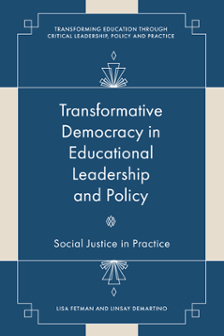
Index
Transformative Democracy in Educational Leadership and Policy
ISBN: 978-1-83753-545-3, eISBN: 978-1-83753-544-6
Publication date: 21 June 2024
Citation
Fetman, L. and DeMartino, L. (2024), "Index", Transformative Democracy in Educational Leadership and Policy (Transforming Education Through Critical Leadership, Policy and Practice), Emerald Publishing Limited, Leeds, pp. 169-176. https://doi.org/10.1108/978-1-83753-544-620241007
Publisher
:Emerald Publishing Limited
Copyright © 2024 Lisa Fetman and Linsay DeMartino. Published under exclusive licence by Emerald Publishing Limited
INDEX
- Prelims
- Chapter 1 The Purpose of Education
- Chapter 2 Where We Continue to Be: Hegemony, Neoliberalism, and Dispossession
- Chapter 3 Where Are We Going? Democracy, Critically-Just Democracy, and Transformative Action
- Chapter 4 Transformative Practices in K-12 Schools
- Chapter 5 Translating Transformative Leadership
- Chapter 6 Where Do We Go From Here? Transformative Practices and the Larger Community
- References
- Index